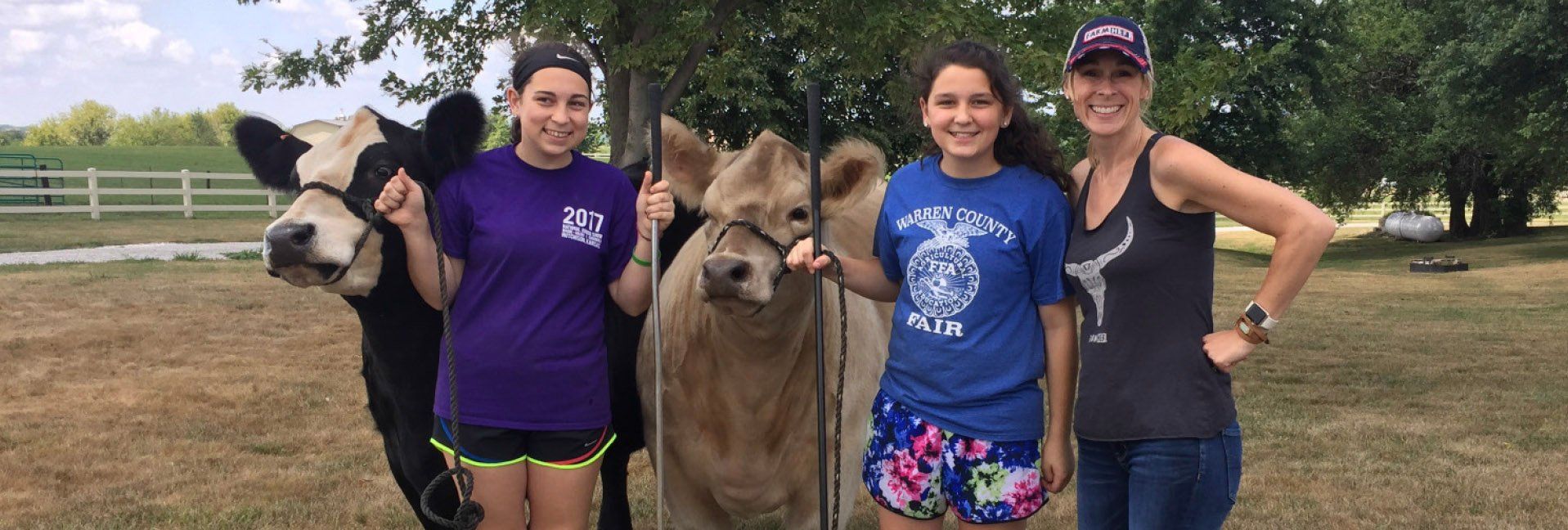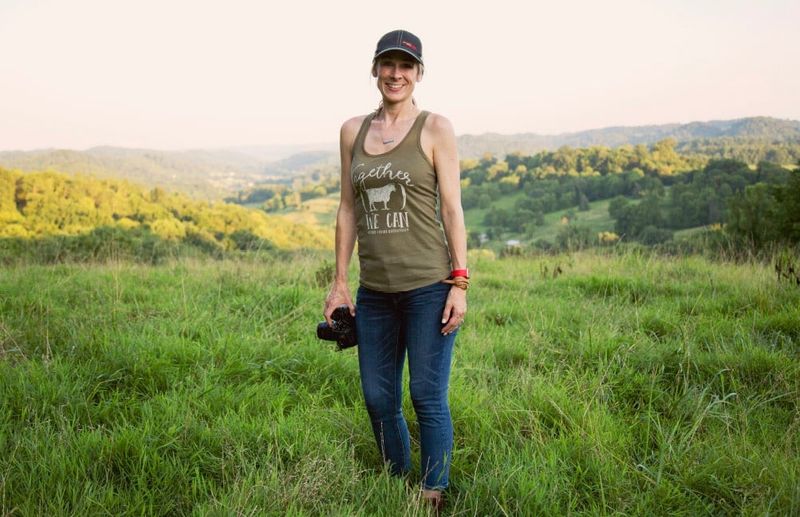FarmHer, Championing inspiration, empowerment, and connections for ag women


Catching Up with Marji Guyler-Alaniz
Some days, it would be easier to go fishing for a unicorn than to catch up with photographer Marji Guyler-Alaniz. As the originator and creative force behind FarmHer, some weeks find Marji up before dawn, visiting as many as six or seven farm women over several states for her RFD-TV program, then writing and editing photos far into the night.
Originally conceived as a simple project to photograph women in agriculture as they go about their day, FarmHer’s message has resonated with rural people of all stripes. It now has grown to encompass events for women (11 are planned for 2019), FarmHer-branded merchandise, the 30-minute weekly RFD-TV show, the 60-minute Shining Bright by FarmHer SiriusXM radio show and podcast, and ongoing social media to connect with her audience.
AcreageLife has been fortunate—and honored—to present Marji’s FarmHers in the past, but we figured it was time to learn a little about the woman making it all happen.

Did your childhood square with what you are doing today?
I spent most of my childhood growing up in the country. We lived on a farm, but my parents didn’t actually farm it, so we had hundreds of acres of playground in our backyard! We built forts in empty grain bins, we rode dirt bikes, and always had outdoor cats around. We had a pond to skate on in the winter and could explore to our heart’s content. I was also in 4-H growing up and had the opportunity to learn and create through that.
What special perspective does your current home give you for FarmHer?
While my husband and I both grew up in the country on farms, we now live in a pretty suburban area. The one thing I can never compromise on is that our house backs up to a small timber of trees. That’s one step I don’t think I can ever take, (having) another house behind my backyard!
The fact that I don’t live or work on a farm gives me a special viewpoint of seeing the beauty…and the beauty that women bring to their work…An outside perspective can be an amazing thing to see something differently. I think I look at it the way a lot of non-farm people would, while staying true to what the reality of farming can be.
What were your first clues that the FarmHer concept could succeed?
When I came up with the idea for a photo project I called FarmHer, I instantly had grand plans because people showed interest when I told people about it. In July of 2013 I launched its social media pages and saw almost instantly that the feedback was great—this topic didn’t matter only to me! Right away it gained great traction and got some national press over the next few months. Looking back, that is when it really hit me.
How did you go about creating FarmHer as a business (and, apparently, as a calling)?
A calling is right! At first, I simply found a few women to photograph. I thought they would tell me no because I wanted to document a day in their life. Honestly, I didn’t know what I was going to do with that, but they trusted me and I am so glad they did. I had a goal of photographing eight women and I did that—all right here in Iowa—before I launched the social media pages in July 2013.
When it instantly got some attention, that is when I pushed down on the gas pedal!…I worked with our local small business development center’s free resources to try to understand a way forward with this as a business. But the path was still pretty murky.
I spent 2014 introducing people to FarmHer, pushing it beyond social media by attending events and talking to people. It always felt like a wildfire when I would go to an event. People were hungry for what FarmHer brought to the table.
I overfilled my calendar and by 2015 I was under water. Got an intern, started our first Grow by FarmHer event (for young women 16 to 22 years old) and was approached by RFD-TV about the TV show. Most of 2016 was spent filming the show and we added a full time staff member for our events and merchandise.
It’s been a lot of faith and belief in the power of what this brand can do for women, and what it can bring to agriculture.
I am super-passionate about FarmHer, and I want to see it succeed for the women who are affected by (the life), to be able to look at themselves in a different light, grow their knowledge or grow their business. That’s what has driven me to keep digging, keep running.
What were the initial problems to overcome?
The biggest was figuring out how this could be a viable business. I spent almost four years “volunteering” for FarmHer. I wasn’t an employee and the business made enough to keep the door open and invest in some new areas, but not enough to pay me…or anybody else, for that matter. The TV show changed that and helped get the word out, solidify our brand, and helped people understand the power and longevity of it.
When you are building a business with no blueprint it can be tough to keep your confidence high, but every time I visited a farm I was reminded why I do this. I found confidence in sticking to it through that passion and drive.
What is your travel schedule like in the field?
Our crew will usually fly in late Sunday, meet up and get our rental SUV or van, and then get to a hotel close to our first farm. We then spend Monday through Thursday filming during most of the daylight hours. We start many days by sun up and use up all the daylight. Then at night we travel to get close to our next location and do it again the next day. It’s pretty normal to cover a few states and a diverse array of farms during that week. We like to cover at least five, sometimes as many as six or seven farms.
In what ways is this kind of shoot different from your still work?
There isn’t a whole lot of time left in my schedule for many more,“still” shoots, but I do like to squeeze them in when I can.
The TV shoots are way different. We have a crew there to film and produce the show, and the day is more scheduled and less go-with-the-flow. For the TV show, we have certain things we have to film to actually pull together a show, where as when its just me, I can take pictures of whatever shows up in front of me. I also have to be on camera with the TV shoots, so there is an added pressure, but I have learned how to manage that and now actually enjoy it.
The funny thing is, I have found that whether its a TV shoot or not, my still photos aren’t really affected.
What’s your workspace and workday like?
About a year and a half ago I moved my office out of the house and rented a small space. We currently have six employees including me. It has been a game changer, allowing me to more easily put down my work at night—well, sometimes. Our office is pretty plain but the walls are all decorated with my photography, of course! We have a good-sized warehouse there too for merchandise fulfillment and storage of our event materials. It’s a pretty fun environment most of the time, though at times it can be intense. There’s always something fun going on…merchandise pictures to take, side meetings happening, or an ice cream truck coming in the summer!
I still spend a lot of nights working from my laptop at home too, after the kids go to bed. Most days I start with a run, to keep my mind and body ticking away. I like to get my kids to school and then spend most of the day in the office, sprinkled with meetings. Then I (try) to put it all down about 4:00 p.m. to get the kids and have some family time.
Also, the recording studio for radio and TV voiceovers is at home. Tony is a musician, so I have wormed my way into his recording studio and have the luxury of recording all of that from my own house. Plus, I have my own sound tech!
How do you keep family life together?
It’s tough. Tony and I have a great partnership and he picks up a lot of the slack, making sure everything happens the way it needs to at home.
I have learned that I have to set limits for myself. I try not to travel two weeks in a row, though it is sometimes unavoidable. My kids are only young once and time with them and being at home matters a lot to me. So, I set limits and I say no to FarmHer things more than I would like. I also don’t get involved in a lot of community stuff as much as I would like to—because I really try to focus on my kids when I can.
I have learned there is no perfection in any of this, so I try to give myself some grace and do what I can, when I can, and make sure I think about my family first before committing to something else.
What have you learned about FarmHers that you didn’t expect to learn?
Even though they all do different things, in different parts of the country at different ages, they are all very connected over why they do it. They do it for a love of the land and/or livestock they raise. They do it for a care about their families and communities, and they are driven by a desire to feed the people of the world. Whether it be their own family, their community or the world, that drives them. These women work hard, for little pay, and not much recognition…and they are some of the best people you will ever meet. I am blessed and humbled to tell their stories.
What does FarmHer look like in the future?
I want FarmHer to keep being a source of inspiration, empowerment and connection for women in all of the ways we are doing it, but to keep expanding our audience. I want to continue the discussion about these women with a broader audience.
Tags:Features

Acreage Life is part of the Catalyst Communications Network publication family.
















